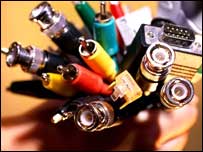|
By Jo Twist
BBC News science and technology reporter
|


Smart homes are becoming more of a reality
|
Smart homes in which a single button controls lighting, heating, security, music, film - everything digital - has long been promised, but has never quite delivered.
This is partly down to technology that cannot talk to each other. It has also traditionally been a dream that only the uber-rich can make reality.
But with rising broadband speeds and connections, the rise of wireless networks, and cheaper more powerful machines in homes, it is getting easier to realise the smart home dream.
A lot more now can be controlled from one central machine, with one central and easy interface, which is what convergence is supposed to be about.
Hooking devices together, either wirelessly or with cables, is another matter.
'Digital plumber'
Technical know-how is just one of the stumbling blocks many face when trying to work out why one gadget will not talk to another.
Homes that are smart are not just about being able to send pictures and video to different rooms either.
It is also about the more mundane technologies in life, such as heating and lighting, and security technologies.
 |
|
QUICK GUIDE

|
|
Central locking for homes, for example, could be all controlled through fobs in the near future, for instance, or even through biometrics.
Will Levy, founder of Touch of a Button, imagines one day soon being able to pick up the phone directory and easily find the equivalent of a registered "digital plumber".
For a reasonable fee, they could come and install your fresh bit of kit, advise on security, and be on hand at the end of an e-mail or phone for aftercare services.
Mr Levy's vision of "digital plumbing" is squarely aimed at ordinary people who want their homes smart and more connected.
"There is a huge amount of integration needed between different products," he told the BBC News website. "There are hundreds of companies which are home automation installers.
"The problem for me is that the starting price for that is a minimum of �27,000."
That is not the way to push convergence and smart home technologies out to the mass market, he says.
"These are not distant future technologies, they are all out on the shelf today, and they are just a few hundred pounds."
He thinks there needs to be more qualified people who can take the ordinary non-technical person step-by-step through the set-up and the integration of technologies with other systems around the home.
"It could be very much like getting the plumber around," says Mr Levy. "I could see in five or 10 years' time having them in the Yellow Pages alongside plumber or electricians that you call out."
Cost of living digitally
According to research by US digital home consultants, The Diffusion Group (TDG), more than half of US households are interested in some sort of home control system, if the price tag is less than $200.
TDG also found that global home networking is set to grow from 35 million households in 2004 to more than 162 million by 2010.

There is more demand for people who can hook up home networks
|
With that, says TDG, the number of devices and gadgets that will be able to use that network will rise from 108 million in 2004 to just shy of one billion by 2010.
Instead of three devices able to talk on the network to others in every household in 2004 on average, there will be six.
Others predict that 23 million European households will be using wireless home networks to share media content by 2009.
Despite these healthy-looking predictions, Intel research on the 21st Century living room revealed that 42% of Brits complained that technology was already crowding them out of their own houses.
One in four living rooms are stacking up more than seven separate technology devices.
The average Brit does not have an American style open-plan living space either. Rooms are smaller and ceilings are lower.
But if there are going to be digital plumbers who can come around and fiddle with plugs and networks, there needs to be an industry standard qualification to protect against digital cowboys.
The ComTIA international standard for teaching such skills is being promoted in certain areas of the UK, such as Yorkshire.
